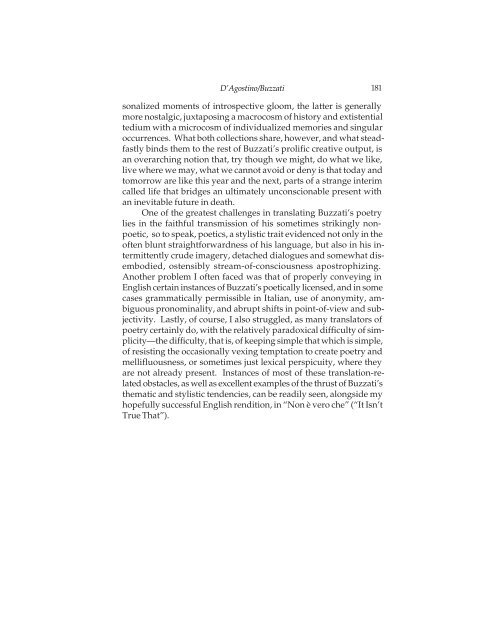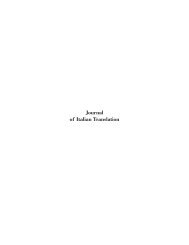Journal of Italian Translation - Brooklyn College - Academic Home ...
Journal of Italian Translation - Brooklyn College - Academic Home ...
Journal of Italian Translation - Brooklyn College - Academic Home ...
You also want an ePaper? Increase the reach of your titles
YUMPU automatically turns print PDFs into web optimized ePapers that Google loves.
D’Agostino/Buzzati 181<br />
sonalized moments <strong>of</strong> introspective gloom, the latter is generally<br />
more nostalgic, juxtaposing a macrocosm <strong>of</strong> history and extistential<br />
tedium with a microcosm <strong>of</strong> individualized memories and singular<br />
occurrences. What both collections share, however, and what steadfastly<br />
binds them to the rest <strong>of</strong> Buzzati’s prolific creative output, is<br />
an overarching notion that, try though we might, do what we like,<br />
live where we may, what we cannot avoid or deny is that today and<br />
tomorrow are like this year and the next, parts <strong>of</strong> a strange interim<br />
called life that bridges an ultimately unconscionable present with<br />
an inevitable future in death.<br />
One <strong>of</strong> the greatest challenges in translating Buzzati’s poetry<br />
lies in the faithful transmission <strong>of</strong> his sometimes strikingly non-<br />
poetic, so to speak, poetics, a stylistic trait evidenced not only in the<br />
<strong>of</strong>ten blunt straightforwardness <strong>of</strong> his language, but also in his intermittently<br />
crude imagery, detached dialogues and somewhat disembodied,<br />
ostensibly stream-<strong>of</strong>-consciousness apostrophizing.<br />
Another problem I <strong>of</strong>ten faced was that <strong>of</strong> properly conveying in<br />
English certain instances <strong>of</strong> Buzzati’s poetically licensed, and in some<br />
cases grammatically permissible in <strong>Italian</strong>, use <strong>of</strong> anonymity, ambiguous<br />
pronominality, and abrupt shifts in point-<strong>of</strong>-view and subjectivity.<br />
Lastly, <strong>of</strong> course, I also struggled, as many translators <strong>of</strong><br />
poetry certainly do, with the relatively paradoxical difficulty <strong>of</strong> simplicity—the<br />
difficulty, that is, <strong>of</strong> keeping simple that which is simple,<br />
<strong>of</strong> resisting the occasionally vexing temptation to create poetry and<br />
mellifluousness, or sometimes just lexical perspicuity, where they<br />
are not already present. Instances <strong>of</strong> most <strong>of</strong> these translation-related<br />
obstacles, as well as excellent examples <strong>of</strong> the thrust <strong>of</strong> Buzzati’s<br />
thematic and stylistic tendencies, can be readily seen, alongside my<br />
hopefully successful English rendition, in “Non è vero che” (“It Isn’t<br />
True That”).
















